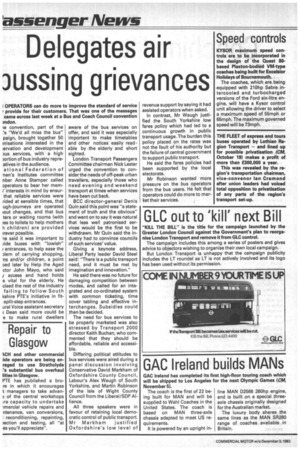Delegates air Jussing grievances
Page 16

If you've noticed an error in this article please click here to report it so we can fix it.
; OPERATORS can do more to improve the standard of service provide for their customers. That was one of the messages came across last week at a Bus and Coach Council convention mdon.
le convention, part of the 's "We'd all miss the bus" paign, brought together 50 inisations interested in the iervation and development Jus services, with a high )ortion of bus industry repro.atives in the audience.
ational Federation of rien's Institutes committee nber Anne Stamper called operators to bear her mem
■ ` interests in mind by ensurthat reliable services were tided at sensible times, that ugh-journeys are operated out changes, and that bus ters or waiting rooms (with .1ss to toilets to help mothers h children) are provided !rover possible.
ie said it was important to tide buses with "lowish" I entrances, to help ease the Diem of carrying shopping, is and/or children, a point oed later by Help the Aged ctor John Mayo, who said / access and hand holds e vital for the elderly. He cised the rest of the industry failing to follow South kshire PTE's initiative in fitsplit-step entrances.
ural Voice assistant secretary < Dean said more could be e to make rural dwellers
Repair to Glasgow
kCH and other commercial icle operators are being enraged to use Strathclyde ,'s substantial bus overhaul lities in Glasgow.
PTE has published a brare in which it encourages t managers to take advan; of the central workshops re capacity to undertake Imercial vehicle repairs and ntenance, van conversions, reconditioning, repainting, )ection and testing, all "at es you'll appreciate". aware of the bus services on offer, and said it was especially important to make timetables and other notices easily readable by the elderly and short sighted.
London Transport Passengers Committee chairman Nick Lester urged the convention to consider the needs of off-peak urban travellers, especially those who need evening and weekend transport at times when services have been cut back.
BCC director-general Denis Quin said this point was "a statement of truth and the obvious" and went on to say it was natural that less well patronised services would be the first to be withdrawn. Mr Quin said the industry had to convince councils of such services' value.
Giving a keynote address, Liberal Party leader David Steel said: "There is a public transport need, and it must be met by imagination and innovation."
He said there was no future for damaging competition between modes, and called for an integrated and co-ordinated system with common ticketing, time cover tabling and effective interchanges. Subsidies could then be decided.
The need for bus services to be properly marketed was also stressed by Transport 2000 director Keith Buchan, who commented that they should be affordable, reliable and accessible.
Differing political attitudes to bus services were aired during a panel discussion involving Conservative David Markham of Oxfordshire County Council, Labour's Alex Waugh of South Yorkshire, and Martin Robinson of the Isle of Wight County Council from the Liberal/SDP Alliance.
All three speakers were in favour of retaining local democratic control of public transport. Mr Markham justified Oxfordshire's low level of revenue support by saying it had assisted operators when asked.
In contrast, Mr Waugh justified the South Yorkshire low fares policy which had led to a continuous growth in public transport usage. The burden this policy placed on the rates was not the fault of his authority but the failure of central government to support public transport.
He said the fares policies had been supported by the local electorate.
Mr Robinson wanted more pressure on the bus operators from the bus users. He felt that operators could do more to market their services.




























































































